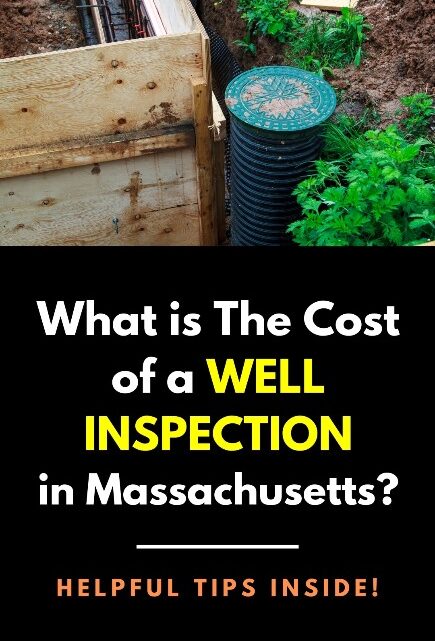A well inspection in Massachusetts is crucial for ensuring the quality and safety of your water supply. Regular inspections help evaluate water quantity, identify necessary repairs or improvements, and prevent further deterioration. The cost of a well check varies based on factors like location and services provided.
Hiring a licensed well inspector who can conduct visual inspections, perform water tests, and assess flow rates is essential. Well inspections are essential in maintaining water quality, especially during real estate transactions and when coordinating with septic system inspections.
In my experience as a real estate agent for the last three decades, skipping a well inspection when buying a house would be a stupid mistake. You could quickly discover there are well problems after moving in. Water well maintenance is a crucial task for a homeowner.
Let’s look at what you need to know.
Average Cost of Well Inspection
A well water assessment is vital to ensure the quality and safety of your drinking supply in Massachusetts. When planning for a well examination, it is essential to understand the factors that influence these inspections’ cost and pricing structure.
By clearly understanding the average cost and related considerations, you can make informed decisions regarding the maintenance and upkeep of your well system.
Factors Influencing the Cost of Well Inspection in Massachusetts
The cost of a well water inspection can vary depending on several key factors:
- Type of inspection: Different types of inspections, such as visual inspections, water testing, and flow rate assessments, may contribute to the overall cost. Some examinations may be more comprehensive and time-consuming, impacting the pricing structure.
- Location: The geographical location within Massachusetts can affect the cost of a well water inspection. Factors such as accessibility to the property and the availability of certified well inspectors in the area can influence pricing.
- Size and depth of the well: Larger and deeper wells may require additional equipment and expertise during the inspection process, potentially increasing the cost.
- Condition of the well system: If your well system has a history of complications or requires repairs, it may require additional time and resources to conduct a thorough inspection, potentially impacting the overall cost.
Understanding the Pricing Structure of Well Inspections
The pricing structure for well inspections in Massachusetts can vary based on different factors. Some well inspectors may charge a flat fee for specific inspection services, while others may have a tiered pricing structure based on the inspection scope or the well system’s size.
It is crucial to inquire about the pricing details with potential well inspectors to ensure transparency and to understand what services are included in the quoted price.
Additionally, it is essential to consider any potential additional costs arising from identified repairs or recommended upgrades during the inspection. These costs should be discussed and clarified upfront to avoid any surprises.
By understanding the various factors that influence the cost of a well inspection and the pricing structure employed by well inspectors, homeowners in Massachusetts can budget effectively and make informed decisions about their well system maintenance and water quality.
Who Conducts Well Inspections in Massachusetts?
In Massachusetts, well inspections are conducted by licensed well inspectors who specialize in assessing the condition and safety of well systems. These professionals play a crucial role in ensuring the quality and reliability of the water supply in residential and commercial properties.
Licensed Well Inspectors in Massachusetts
Licensed well inspectors in Massachusetts have undergone rigorous training and certification processes to demonstrate their expertise in evaluating well systems. They know the state regulations and guidelines concerning well inspections, water quality standards, and safety measures.
To become licensed, well inspectors must meet specific education and experience requirements and pass examinations that evaluate their understanding of well systems, water testing procedures, and relevant codes and regulations. This licensing ensures that they possess the necessary knowledge and skills to accurately assess and report on the condition of wells in Massachusetts.
Qualifications of Licensed Well Inspectors
Licensed well inspectors in Massachusetts should have the following qualifications:
- A valid license issued by the state regulatory authority
- Completion of required education and training programs
- Demonstrated knowledge of Massachusetts well regulations and guidelines
- Experience in conducting well inspections and analyzing water quality
- Proficiency in using specialized tools and equipment for well water assessments
Roles and Responsibilities of Well Inspectors
The primary role of well inspectors is to conduct thorough inspections of well systems to assess their condition, functionality, and compliance with regulatory standards. They perform visual inspections, conduct water sampling and testing, and evaluate various well components, including pumps, pipes, and pressure systems.
During the inspection process, well inspectors meticulously examine the well system’s equipment, infrastructure, and overall performance. They may also conduct flow rate tests to determine the water supply capacity of the well and identify any potential deficiencies.
Based on their findings, licensed well inspectors provide detailed reports that outline the current condition of the well, highlight any identified issues or areas of concern, and make recommendations for necessary repairs, maintenance, or improvements. Their assessments help property owners and buyers make informed decisions regarding their water supply systems.
It’s important to note that well inspectors do not typically perform repairs or implement corrective measures themselves. Their role is solely to assess the condition of the well system and provide professional recommendations. Property owners can then engage qualified professionals to address identified issues or perform the suggested repairs or upgrades.
By consulting with licensed well inspectors in Massachusetts, property owners can gain valuable insights into the condition and performance of their well systems, ensuring their water supply’s continued safety and reliability.
Importance of Well Inspections for Water Quality and Safety
An essential aspect of maintaining a safe and reliable water supply in Massachusetts is conducting regular well inspections. These inspections play a crucial role in ensuring the safety and potability of well water and identifying potential issues and hazards in the well system.
Ensuring the Safety and Potability of Well Water
One of the primary reasons for conducting well inspections is to ensure the safety and potability of the well’s supplied water. During a well water inspection, water samples are collected and tested in certified laboratories to detect the presence of contaminants, bacteria, or other harmful substances.
By assessing the well water quality, homeowners and property owners can take appropriate measures to address any issues and safeguard the health of those who rely on the water supply.
Identifying Potential Issues and Hazards in Well Systems
A comprehensive well inspection goes beyond water testing and includes a visual assessment of the well system. To identify potential issues or hazards, trained inspectors thoroughly examine components, such as the well pump, pressure tank, piping, and electrical connections.
By detecting issues like leaks, corrosion, or mechanical failures, well inspections help prevent more significant problems that could jeopardize the functionality and safety of the well system. Prompt identification of issues also allows for timely repairs or improvements, saving homeowners from costly damages and disruptions in water supply.
Signs that may indicate the need for a well water inspection include the following:
- Changes in water taste, color, or odor
- Low water pressure or flow
- Frequent pump cycling or unusual noises
- Visible signs of corrosion or leaks in the well system
- Environmental events near the well, like flooding or contamination risks
Regular well inspections provide peace of mind, as they help homeowners proactively address potential issues and maintain the efficiency and safety of the well system.
Critical Elements of a Well Inspection Process
Regarding well inspections in Massachusetts, several key elements are essential to ensure the quality and safety of your water supply. A thorough inspection involves a comprehensive evaluation of the well equipment and components, water testing and analysis to ensure water quality, and assessing water pressure and flow rate. Let’s dive into each of these elements:
Visual Inspection of Well Equipment and Components
A visual inspection of the well equipment and components is the first step in the well inspection process. This involves examining the well cap, casing, pump, pressure tank, electrical connections, and other equipment. The inspector will look for signs of damage, leaks, corrosion, or any other issues that could affect the performance and functionality of the well system.
If any problems are detected during the visual inspection, further evaluation or repairs may be necessary to ensure the proper functioning of the well system. This step is crucial to identify potential hazards and prevent future issues that could compromise the water quality or supply.
Water Testing and Analysis for Quality Assurance
Water testing is a critical component of the well inspection process. Samples are collected from the well and sent to a certified laboratory for analysis. The water is tested for various parameters, including bacteria, nitrates, pH levels, minerals, and other contaminants that could impact the safety and potability of the water.
The results of the water tests provide valuable insights into the overall quality of the water supply. Suppose any issues are detected, such as bacterial contamination or elevated levels of harmful substances. In that case, appropriate measures can be taken to address these concerns and ensure the water meets the necessary standards.
Assessing Water Pressure and Flow Rate
Assessing the water pressure and flow rate is another crucial aspect of a well water inspection. This involves determining the capacity of the well to deliver adequate water to meet the property’s needs. The inspector will measure the water pressure and flow rate to evaluate the efficiency and performance of the well system.
If the water pressure or flow rate is insufficient, it may indicate underlying issues such as a clogged well screen, a damaged pump, or a decline in water levels. In such cases, recommendations for improvements or repairs will be provided to ensure optimal performance and a reliable water supply.
In conclusion, a comprehensive well inspection in Massachusetts includes a visual inspection of well equipment, water testing for quality assurance, and an assessment of water pressure and flow rate. These fundamental elements thoroughly evaluate the well system, ensuring your water supply’s safety, functionality, and quality.
Maintenance and Upkeep of Well Systems
Proper maintenance and regular upkeep are essential for ensuring the longevity and efficiency of well systems. As a private well owner in Massachusetts, it’s necessary to follow these maintenance tips, watch out for signs indicating the need for repairs, and ensure proper well water cap and pump maintenance.
Essential Maintenance Tips for Well Owners
- Regularly inspect the well equipment and components for any visible signs of damage or wear. Look for leaks, corrosion, or loose fittings.
- Ensure the well casing is secure and free from any cracks or openings that could allow contaminants to enter the well.
- Keep the well area clean and free from debris, chemicals, and other potential sources of contamination.
- Maintain a safe distance between the well and any potential sources of contamination, such as septic systems, fuel tanks, or chemical storage areas.
- Monitor the water pressure and flow rate regularly to ensure the proper functioning of the well system.
- Follow the recommended well maintenance schedule provided by your licensed well inspector.
Signs Indicating the Need for Well System Repairs
- Low water pressure or irregular water flow could indicate a problem with the well system. If you notice a significant decrease in water pressure, inspecting your well for potential issues is essential.
- Discolored or cloudy water may indicate the presence of contaminants or sediments in the well. This could be a sign of a malfunctioning well system or potential sources of contamination.
- Unpleasant odors or strange tastes in the water could indicate the presence of bacteria, chemicals, or other contaminants. These issues should be addressed promptly to ensure water safety.
- Frequent pump cycling or unusual sounds from the well system could indicate a problem with the pump or other components. Having these issues diagnosed and repaired by a licensed professional is essential.
Proper Well Cap and Pump Maintenance
- Inspect the well cap regularly to ensure it is secure and in good condition. The well cap prevents debris, insects, and other contaminants from entering the well.
- Clean the well cap periodically to remove any dirt or debris that may have accumulated on its surface.
- Properly seal any gaps or openings in the well cap to prevent the entry of contaminants.
- Maintain the well pump by regularly checking its pressure, lubricating moving parts if required, and addressing any issues with the help of a licensed well inspector.
By following these maintenance tips and staying vigilant for any signs of trouble, well owners can ensure the longevity, efficiency, and safety of their well systems in Massachusetts.
Well Inspections during Home Sales and Purchases
The Role of Well Inspections in Real Estate Transactions
Private well inspections play a crucial role in ensuring the safety and quality of the water supply during home sales and purchases in Massachusetts. When buying or selling a property with a well system, it is essential to conduct a thorough inspection to assess the condition of the well and its components.
This inspection provides valuable information to the buyer and the seller, helping them make informed decisions regarding the transaction. During a private well inspection, a licensed inspector assesses the equipment, checks for any potential issues or hazards, and evaluates the overall functionality of the well water system.
The inspection helps identify any existing problems or the need for future repairs, allowing the buyer and seller to negotiate accordingly. It also ensures compliance with any legal requirements related to well systems in Massachusetts. In my experience as a Realtor, I always recommend my clients have the well assessed for quality and quantity.
Working with Realtors and Agents for Well Inspections
Realtors and real estate agents facilitate well inspections during home sales and purchases. They understand the importance of water quality and safety for potential buyers and often recommend well inspections as part of the due diligence process. They can help facilitate the inspection scheduling and coordinate with the seller and inspector to ensure a smooth process.
Realtors and agents can also provide valuable guidance to buyers regarding the significance of well inspections and their potential impact on the property value. They can help interpret the inspection report and assist buyers in making informed decisions based on the findings.
With their expertise, buyers, and sellers prioritize the well’s condition and take appropriate actions to address any issues discovered during the inspection. In summary, well inspections are critical during home sales and purchases in Massachusetts.
By prioritizing well inspections, buyers and sellers can confidently proceed with their real estate transactions while ensuring the long-term reliability and functionality of the well system.
Well Inspections and Septic Systems
It’s essential to understand the interconnection between wells and septic systems. Coordinating well inspections with septic inspections ensures both systems’ safety and functionality. In Massachusetts, sellers are required to pass a Title V septic inspection.
Coordinating Well Inspections with Septic Inspections
Well and septic inspections often go hand in hand, especially during real estate transactions. It is advisable to schedule both inspections simultaneously to assess the overall condition of the property’s water supply and waste management systems.
By coordinating well and septic inspections, potential issues and risks can be identified more effectively. This approach comprehensively evaluates the property’s water and sanitary systems, providing valuable insights into their interrelationship. Septic system maintenance is especially important when you have a private well.
Understanding the Interconnection between Wells and Septic Systems
Wells and septic systems are interconnected regarding their impact on water quality and safety. A malfunctioning septic system can contaminate the groundwater that supplies the well, compromising the water quality.
During well inspections, the inspector may assess the distance and separation between the well and the septic system to ensure compliance with state regulations. If the well is too close to the septic system, it may pose a potential health hazard.
Understanding the interplay between wells and septic systems is crucial for maintaining a safe and healthy water supply. By addressing any issues detected during inspections, homeowners can protect their well water from contamination and ensure the proper functioning of their septic system.
By coordinating well inspections with septic inspections and understanding the connection between these systems, homeowners in Massachusetts can ensure the integrity and safety of their water supply and waste management systems.
Red Flags and Common Challenges in Well Inspections
Certain red flags and common challenges may arise in private well inspections, necessitating prompt attention and resolution. It is essential to address these issues effectively to maintain water quality and ensure the proper functioning of the well system.
Addressing Contamination and Water Quality Issues
Contamination and water quality problems can significantly impact the safety and potability of well water. During inspections, signs of contamination, such as bacteria, chemicals, or high levels of minerals, should be carefully evaluated. If contamination is suspected, immediate action should be taken to identify the source and implement remedial measures.
Common water quality issues typically include:
- Foul odor or taste in well water
- Discoloration or cloudiness
- Excessive sediment or particulate matter
A certified well inspector will conduct appropriate tests, including bacteriological and chemical analyses, to determine the level of contamination and recommend suitable treatment options. It is crucial to address water quality issues promptly to safeguard the health and well-being of residents relying on the well for their water supply.
Dealing with Aging or Inefficient Well Systems
As private well systems age, they may become less efficient and more prone to malfunctions and breakdowns. Understanding the signs of aging or inefficient systems can help identify potential issues during inspections.
Common indicators of aging or inefficient well systems include:
- Decreased water pressure or flow
- Frequent pump cycling or short cycling
- Unexplained increases in energy consumption
- Noisy or irregular pump operation
These symptoms may indicate problems such as wear and tear on the pump, deteriorating well casing, or a declining water table. Addressing these issues promptly can prevent more significant problems, ensuring the well system’s effective functioning and maintaining water supply reliability.
A licensed well inspector can assess potential problems with aging or inefficient well systems and recommend appropriate maintenance, repairs, or upgrades to enhance system performance and longevity.
Awareness of these red flags and common challenges during well inspections is critical in maintaining a safe and reliable water supply for residences in Massachusetts. Promptly addressing contamination and water quality issues and dealing with aging or inefficient well systems ensures the well system operates optimally and provides clean, potable water to households.
Well Inspections: FAQs
How much does a private well inspection cost in Massachusetts?
The cost of a well water inspection in Massachusetts can vary depending on various factors, such as the size of the well, location, and the specific services included in the review. On average, a well inspection in Massachusetts can range from $150 to $500.
It’s essential to contact licensed well inspectors in your area to get accurate pricing information based on your specific needs and requirements.
What should you expect during a well inspection?
During a private well water inspection, a licensed well inspector will thoroughly evaluate your well water system to assess its overall condition, water quality, and functionality. This may include a visual inspection of the well equipment, such as the pump and pressure tank, and water testing to check for contamination or other water quality issues.
The inspector may also measure the water flow rate and assess the overall efficiency of the well system.
How often should well inspections be conducted?
It is generally recommended to have a private well inspection conducted at least once every two to three years, even if there are no apparent issues with your well system. However, suppose you notice any changes in water quality, such as a strange taste or odor, low water pressure, or visible signs of deterioration. In that case, it is advisable to schedule an inspection promptly.
Regular inspections help ensure your well water supply’s ongoing safety and performance.
Can well inspections detect hidden issues?
Yes, well inspections can often detect hidden issues that may not be immediately apparent. Licensed well inspectors are trained to look for signs of potential problems, such as cracks in the well casing, leaks in the plumbing connections, faulty pressure switches, or contamination from nearby sources.
Through comprehensive visual inspections, water testing, and flow rate measurements, well inspectors can identify underlying issues and recommend necessary repairs or maintenance.
Are there any legal requirements for private well water inspections in Massachusetts?
Massachusetts has no specific legal requirements mandating well inspections for all properties. However, some local jurisdictions may have regulations or guidelines regarding well assessments, especially in real estate transactions.
It is always advisable to check with local authorities, real estate professionals, or a licensed well inspector to understand any specific requirements or recommendations about well water inspections in your area.













No Comment